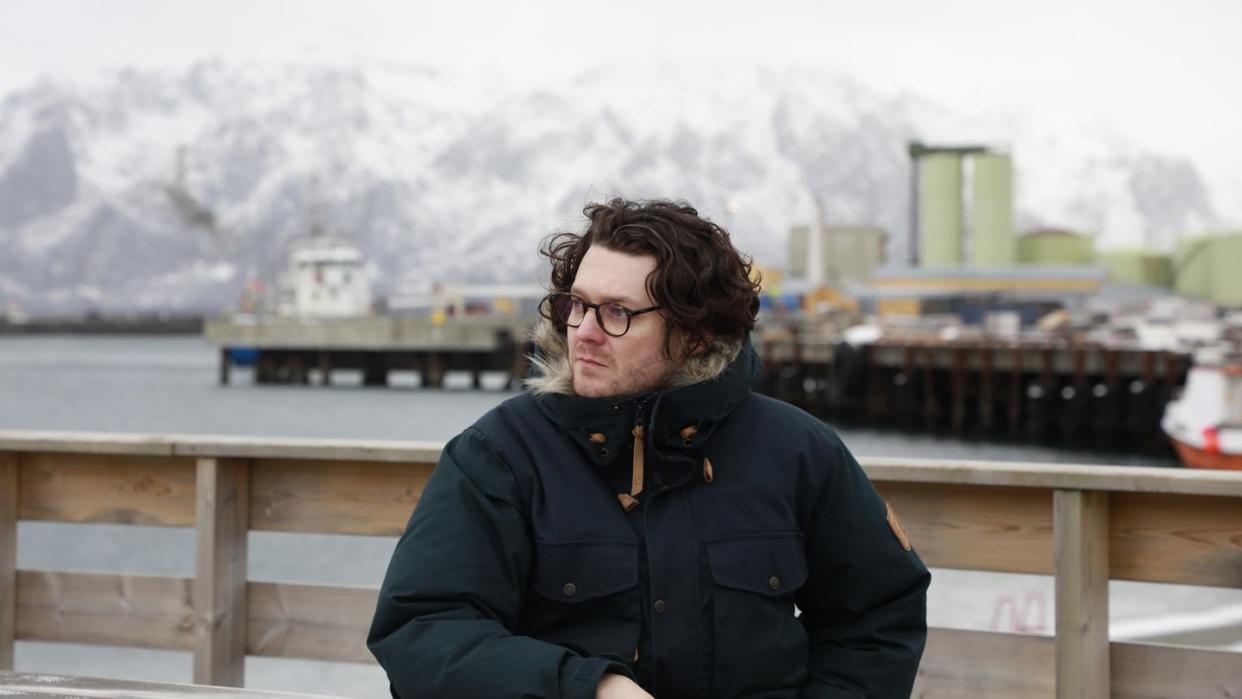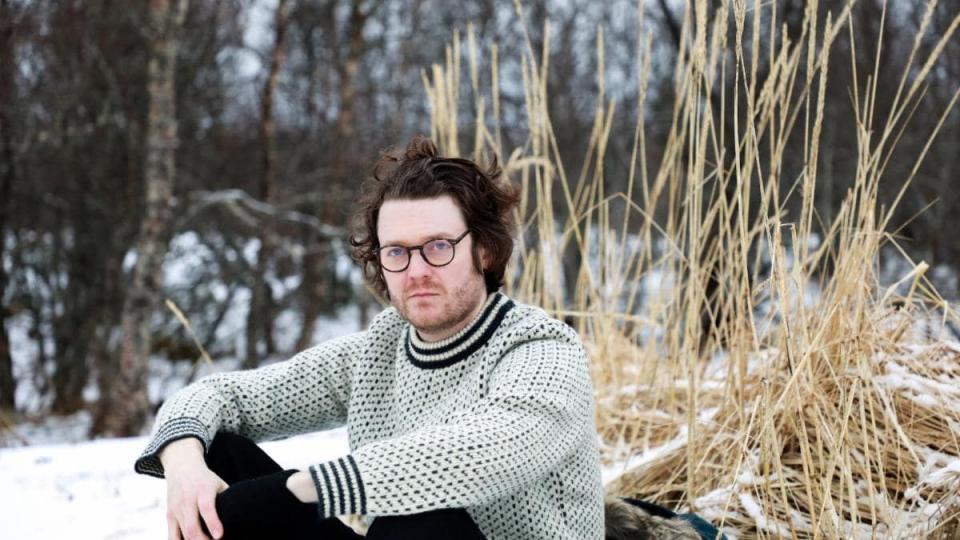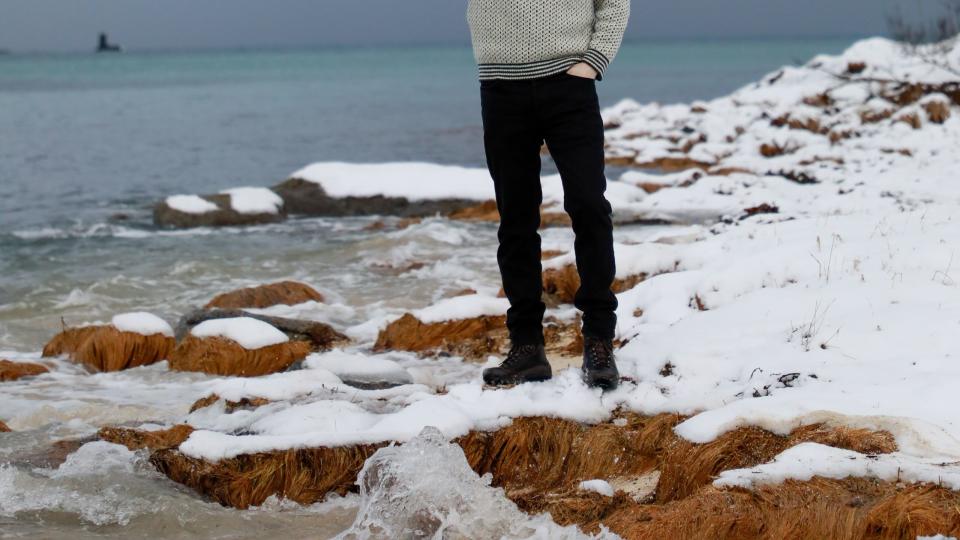Beirut's Zach Condon Is Accepting His Demons

When Beirut released Gulag Orkestar in 2006, its swaying horns and eclectic percussion treated music lovers to a sound that was relatively foreign to American music made west of the Atlantic Ocean. The record’s inventive use of Balkan melodies and triumphant brass garnered near-immediate critical praise. The feat was especially impressive, considering that—for the most part—one man is behind Beirut: Zach Condon.
Born in Albuquerque, New Mexico, Condon's debut at just 19 years old was a shock to anyone who thought they were listening to Brandenburg’s preeminent elder sing to the neighborhood as the children skipped stones in the street. But Condon never lived that life. He was a teenager so obsessed with rare instruments, world history, and Middle Eastern architecture that he could fabricate deep nostalgia in his music for a beautiful, European paradise that never existed.
Behind the scenes of this cinematic, Sicilian holiday dreamscape, Condon battled personal demons. A combination of stress, sleep deprivation, and addiction forced the musician to cancel his world tour in 2019. The Covid-19 pandemic hit soon after. Condon fled to an idyllic, isolated town in Northern Norway to "get away from everything," as the 37-year-old recently told me over Zoom. "I thought I could just escape into this magical place and everything would be fine." But after meeting a local church organ player and like-minded rare instrument collector named Oddvar, everything turned around. Condon fell in love with Norway and began recording Hadsel—his first new album in four years, which is out today.
Filling the room with warm church organs, horns, and baritone ukulele, Hadsel is a familiar sound from Condon, but it's more focused on hope than on worldly wanderlust. "Leap from the sill, see where we land/safe from the wind, head in the sand," he sings on "So Many Plans." It's a blend of loss, adventure, and acceptance that marks the musician's current journey. Hadsel is also an entirely independent release. "It was proving something to myself," Condon says. "Even if I couldn’t run my life smoothly, I could make an album." Below, the singer opens up about his time in Norway, his fascination with atypical instruments, and a mental collapse that almost led to permanent vocal damage.

ESQUIRE: Your music is very worldly. Do you feel a natural connection to all the places you visit?
ZACH CONDON: When I was 15, no one would ever hear my music except for my older brother and my best friend. I didn’t play shows. I don’t know where this comes from, but I was super obsessed with Middle Eastern music and architecture. To this day, I have all these coffee table books of mosques. I get obsessed with the history of places. I respect that I’m an outsider, but when I come to places I try to assimilate as much as possible and I don't see other people doing that. A part of me is a bit conservative in that way. That’s why I left New York.
Is that feeling part of what led you to seek an isolated experience in Norway?
Yeah. That was a mixture of things, but a big part of it was just fleeing. At the time, my level of frustration wasn’t as big because I was so lost in my own little story. But it’s not so much what drove me there. The driving factor was a couple of nearly delusional ideas on my part. [Laughs.] I was stuck here in Berlin for like three years during COVID, and the first place I went to when it all lifted was Norway. I’m looking to maybe move there actually, because it’s such a wonderful place. The family who owned the property I was on and the people they introduced me to were much more grounded in reality. It’s funny because I was literally in the dark, but I was also figuratively in the dark. I was looking at landscapes and meeting people at the church, but it felt like I was on another planet. I really liked how Northern Norway fit my personality. They tended to be a lot more reserved, and they didn’t give all away. They were polite and warm, but they wait for things to grow.
How did you meet Oddvar the organ collector?
I was looking at the listing for the cabin rental, and there was a pump organ in one of their pictures. I was asking the owner, ‘Hey, does it work? Is it in tune?' A lot of people, if they even still have them, just keep them as furniture. But they knew that it worked because their friend, Oddvar, collects and repairs them. At that point, I was really, really interested. It turns out that he played organ for the church on special request, and was completely self-taught. I went to the church and at first he was like, 'Please, we let people play the organ. Enjoy.' But after we were sitting and chatting, he was just blown away that I was really into all these old instruments. I got to see his big collection, and he started bringing out fishcakes to eat. He’d just walk in sometimes with big freezer bags of fish that he caught.
Most kids, unless they’re in band at school, have never heard of a flugelhorn. Was there someone in your life who introduced you to rare instruments?
My dad was a real big music person. I rebelled against guitar at an early age. I don’t know if it was because I was frustrated by the instrument or if I was upset at my father’s pressure that, ‘This is what you ought to play because it matters to me.’ His father played saxophone, and I even rebelled against that. I thought, ‘No, trumpet.’ I have this contrarian part of me. When I started making music, I was just hearing an orthodoxy of guitar, bass, drums. All my friends were joining punk bands, and it was just raw noise. It wasn’t very musical or pretty. At home, I was listening to records from all over the world. I saw these Mariachi bands, and that was like my electric guitar. Bossa Nova kind of cracked me open. I also worked at a movie theater, and I would hear Balkan brass scores. When going online was kind of a new thing, I would search for Arabic music. I wanted a rich, open palette.
It's interesting that you wanted to rebel from your father and forge your own path, but it sounds like you still never questioned music as something that you wanted to do.
Yeah, that’s the thing. What my dad wanted from me was to be a musician’s musician. The kind that could go to Berklee and get into a philharmonic. But the love of the music was early. My father started noticing that I was collecting all these instruments, and he told me that my grandfather did that too. He had a farfisa organ, a saxophone, and an upright bass. He was interested in this broad range. My grandmother also played piano, bagpipes, and accordion. My first accordion was hers, and she was the first person who sat with me at the piano while I was figuring out scales. We would sing Christmas songs together, and I really loved that.
How did you come up with the name Beirut?
My brother threw the name Beirut at me because I was reading a lot about Lebanon and the Middle East at the time. But I grew up with a lot of country music, and I’ve fallen in love with it again. I was listening to a ton of country music up in Norway, and I was laughing that these guys were just like me. 90 percent of their song titles are just city names. My parents would take us on these long road trips through New Mexico, Oklahoma, and Missouri, and they would play all their Oklahoma songs when we drove through the state, and the same for when we got to St. Louis. Somehow, that all just settled in my brain. Later, I I just used that same kind of songwriting shortcut. Now, I do it more tongue-and-cheek. ProTools will ask you to name your song before you start, so I’ll just point at the map and be like “OK. Here we go.”

When you released the single, "So Many Plans," you described a "mental collapse" that you pushed aside since childhood. Is there anything more that you would be willing to share about that time?
I waited to release this record partially because I wanted to see how comfortable I would be talking about it. Otherwise, if I were to talk about the record without mentioning this stuff, I would just feel like I was covering up a bunch of shit. But it has really helped me hearing people talk about addiction. That’s one of the reasons why I quit drinking in 2018. When I canceled the 2019 tour, I had had a little time [being sober] but it wasn’t enough. You get this initial excitement when you drop a heavy habit like that. Like, ‘If I can beat that, I can do anything!’ So, I was like, ‘Let’s do a world tour!’ Boy was that delusional. I got on the road and I thought, Well, this is why I drink.
What did you feel when you canceled the tour?
It was a combination of sleep deprivation, constant new input, a new city every day, scrambling to find something to eat. It’s just tension, all the time, and it really fucks me up. I’m more sensitive to it than others. With drinking, you just drown it. My body was going haywire, looking for ways to get me out of it. I would get extremely ill, and I eventually had to cancel the tour. I was on nonstop antibiotics and steroids for three weeks to deal with the infection and inflammation I was having. I had a talk with my manager about how it could lead to major vocal damage. I have gut issues to this day, and it’s just a fucking mess. My first tour when I was 19 ended in me being hospitalized for days because of a panic disorder. My parents were scared that I really couldn’t function at all, and I started writing The Flying Club Cup at that time. There’s a photo of me at the time where my hair is all messed up, and it’s because I still had all the EKG glue on me. I was brushing all that under the rug for years, and when I finally gave myself space in Norway, I just did what I had to do to take care of myself. In that dark and quiet, it just hit me.
Now that the album is finished and you’ve had time to reflect, have you reached a place where you’re feeling more at peace with it?
I have a lot more perspective. It’s a lot easier now to see paranoid thinking, obsessive qualities, or magical nonsense that’s not based on reality. I can protect myself better. But it doesn’t matter in some ways how much I know that I’m not acting rationally. So, there’s still some really tough days. It’s never like, 'Oh, I’ve figured it out, I’m better now.' And that’s good for people to know. You can hear it in some of the lyrics, to some extent. But I was convinced back then that you could just get to the bottom of it and be done with it. That’s not how it works.
What do you hope people walk away with after they hear Hadsel?
When I’m writing songs and having a really good time, the worst thing that happens is when I overthink it. It’s just fucking vibrations. I’m spending my whole life getting vibrations right. [Laughs.] But there are some deep emotions and sensations that are called out of the ether when a good song at the right time comes on. If that’s working for people, that’s the best I can do.
You Might Also Like
